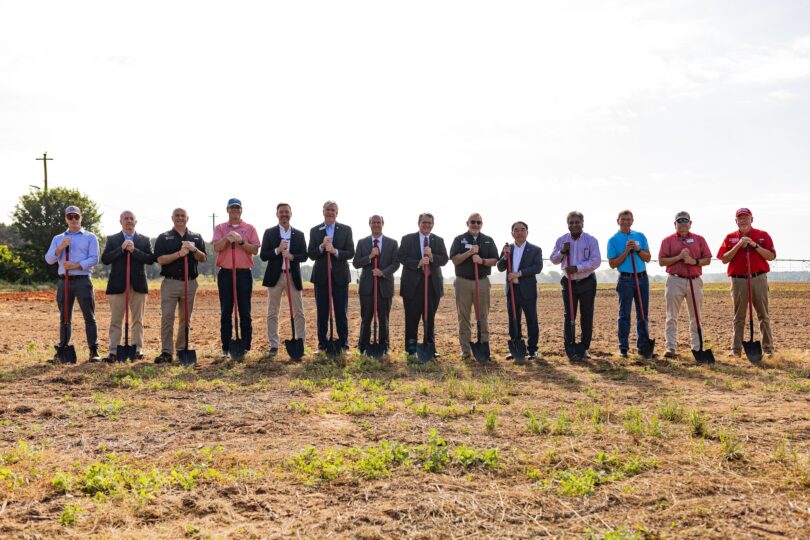
The Transfer Pathways Program is opening new doors for rural students who dream of attending the University of Georgia College of Agricultural and Environmental Sciences (CAES).
In partnership with Wiregrass Georgia Technical College and Southern Regional Technical College, both of which have multiple campuses throughout the southern part of the state, students who complete required coursework at these institutions can transfer to CAES to complete bachelor’s degrees in one of three majors — agribusiness, agricultural education, and agriscience and environmental systems.
Designed to provide students in rural south Georgia with another option for pursuing a degree at UGA, the transfer program enables students to start their education closer to home, completing strategically aligned general core and introductory coursework at technical colleges. After successfully completing two years of coursework, Transfer Pathways students will transfer as juniors to continue in their chosen programs on the university's Athens, Griffin or Tifton campuses, ultimately earning degrees that lead to in-demand careers in agriculture.
Bridging educational gaps with strategic partnerships
By partnering with technical colleges deeply rooted in rural Georgia, CAES aims to open doors to agricultural careers and reinforce UGA’s leadership in educating students on state-of-the-art agricultural developments.
CAES Associate Dean for Academic and Faculty Affairs Dean Kopsell emphasized the collaboration’s projected impact at a signing event on the Tifton campus.
“This collaboration reflects our commitment to providing students with an accessible transition to expand their educational horizons and achieve their career aspirations,” he said. “We eagerly anticipate welcoming students who have received exceptional foundational training from our technical college partners. By working together, this initiative will address workforce needs in Georgia’s agricultural sectors.”
George Vellidis, University Professor in the Department of Crop and Soil Sciences at UGA-Tifton, explained that this approach redefines transfer pathways as intentional and forward-thinking.
“In the past, transferring was often viewed as a backup plan, but we want students to understand that it is a strategic choice that allows them to start strong and finish with a competitive UGA degree,” said Vellidis. “This approach enhances the talent pool for agricultural careers and makes it clear that students from rural areas have direct access to UGA’s resources and opportunities.”

Supporting student success from high school to UGA
Vellidis and a team of administrators are collaborating with colleagues at the two technical colleges to align course requirements and create a direct, supportive pathway for students. Katy Warren, UGA-Tifton student affairs coordinator and former staff member at Southern Regional Technical College, has played a key role in helping establish the transfer pathways for a seamless transition. This model enables students to benefit from the close attention typical of smaller institutions before transitioning to CAES, she explained.
“Our technical college partners offer a learning environment where faculty have close relationships with students,” Warren said. “This breaks the stereotype about educational quality at smaller schools and gives students a strong foundation before they transfer.”
Warren is also coordinating with the two technical colleges to recruit students from high schools, highlighting dual enrollment opportunities. High school students can now take transferable courses, enter a technical college program, and ultimately transfer to CAES as juniors, saving time and expense while pursuing their career goals.
Addressing workforce needs in Georgia’s agricultural sector
The transfer program benefits students while addressing the state’s workforce demands, aligning with industry needs to create a steady flow of capable young professionals, Vellidis explained.
“The state’s agricultural sector faces a shortage of qualified graduates in critical fields like agribusiness, agriscience and precision agriculture, leaving many high-demand jobs unfilled,” he said. “This initiative will help us build capacity to meet those needs more sufficiently.”
Integrative precision agriculture is a rapidly growing field requiring a blend of technology and agronomic expertise to improve farming efficiency, Vellidis said. The technical colleges and CAES are developing two precision agriculture pathways — one leading to an associate degree in science at Wiregrass Georgia Technical College focused on supporting advanced agricultural equipment and the second leading to a bachelor of science degree in agriscience and environmental systems at UGA, focused on data analytics, artificial intelligence and computer vision applications in agronomy.
With these new agreements, the Transfer Pathways Program will create a more inclusive and accessible educational environment to support the agriculture industry.
To learn more about CAES majors offered at the three campuses throughout the state, visit caes.uga.edu/students.






